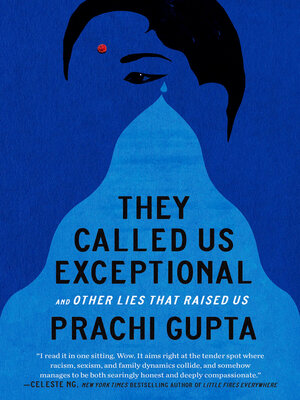
Sign up to save your library
With an OverDrive account, you can save your favorite libraries for at-a-glance information about availability. Find out more about OverDrive accounts.
Find this title in Libby, the library reading app by OverDrive.



Search for a digital library with this title
Title found at these libraries:
| Loading... |
“In this vulnerable and courageous memoir, Prachi Gupta takes the myth of the exceptional Indian American family to task.”—The Washington Post
“I read it in one sitting. Wow. It aims right at the tender spot where racism, sexism, and family dynamics collide, and somehow manages to be both searingly honest and deeply compassionate.”—Celeste Ng, New York Times bestselling author of Little Fires Everywhere
A SHE READS BEST BOOK OF THE YEAR • ONE OF THE BEST BOOKS OF THE SEASON: The New York Times, The Washington Post, The Boston Globe, Bustle
How do we understand ourselves when the story about who we are supposed to be is stronger than our sense of self? What do we stand to gain—and lose—by taking control of our narrative?
Family defined the cultural identity of Prachi and her brother, Yush, connecting them to a larger Indian American community amid white suburbia. But their belonging was predicated on a powerful myth: the idea that Asian Americans, and Indian Americans in particular, have perfected the alchemy of middle-class life, raising tight-knit, high-achieving families that are immune to hardship. Molding oneself to fit this image often comes at a steep, but hidden, cost. In They Called Us Exceptional, Gupta articulates the dissonance, shame, and isolation of being upheld as an American success story while privately navigating traumas the world says do not exist.
Gupta addresses her story to her mother, braiding a deeply vulnerable personal narrative with history, postcolonial theory, and research on mental health to show how she slowly made sense of her reality and freed herself from the pervasive, reductive myth that had once defined her. But tragically, the act that liberated Gupta was also the act that distanced her from those she loved most. By charting her family’s slow unraveling, and her determination to break the cycle, Gupta shows how traditional notions of success keep us disconnected from ourselves and one another—and passionately argues why we must orient ourselves toward compassion over belonging.
“I read it in one sitting. Wow. It aims right at the tender spot where racism, sexism, and family dynamics collide, and somehow manages to be both searingly honest and deeply compassionate.”—Celeste Ng, New York Times bestselling author of Little Fires Everywhere
A SHE READS BEST BOOK OF THE YEAR • ONE OF THE BEST BOOKS OF THE SEASON: The New York Times, The Washington Post, The Boston Globe, Bustle
How do we understand ourselves when the story about who we are supposed to be is stronger than our sense of self? What do we stand to gain—and lose—by taking control of our narrative?
Family defined the cultural identity of Prachi and her brother, Yush, connecting them to a larger Indian American community amid white suburbia. But their belonging was predicated on a powerful myth: the idea that Asian Americans, and Indian Americans in particular, have perfected the alchemy of middle-class life, raising tight-knit, high-achieving families that are immune to hardship. Molding oneself to fit this image often comes at a steep, but hidden, cost. In They Called Us Exceptional, Gupta articulates the dissonance, shame, and isolation of being upheld as an American success story while privately navigating traumas the world says do not exist.
Gupta addresses her story to her mother, braiding a deeply vulnerable personal narrative with history, postcolonial theory, and research on mental health to show how she slowly made sense of her reality and freed herself from the pervasive, reductive myth that had once defined her. But tragically, the act that liberated Gupta was also the act that distanced her from those she loved most. By charting her family’s slow unraveling, and her determination to break the cycle, Gupta shows how traditional notions of success keep us disconnected from ourselves and one another—and passionately argues why we must orient ourselves toward compassion over belonging.






